
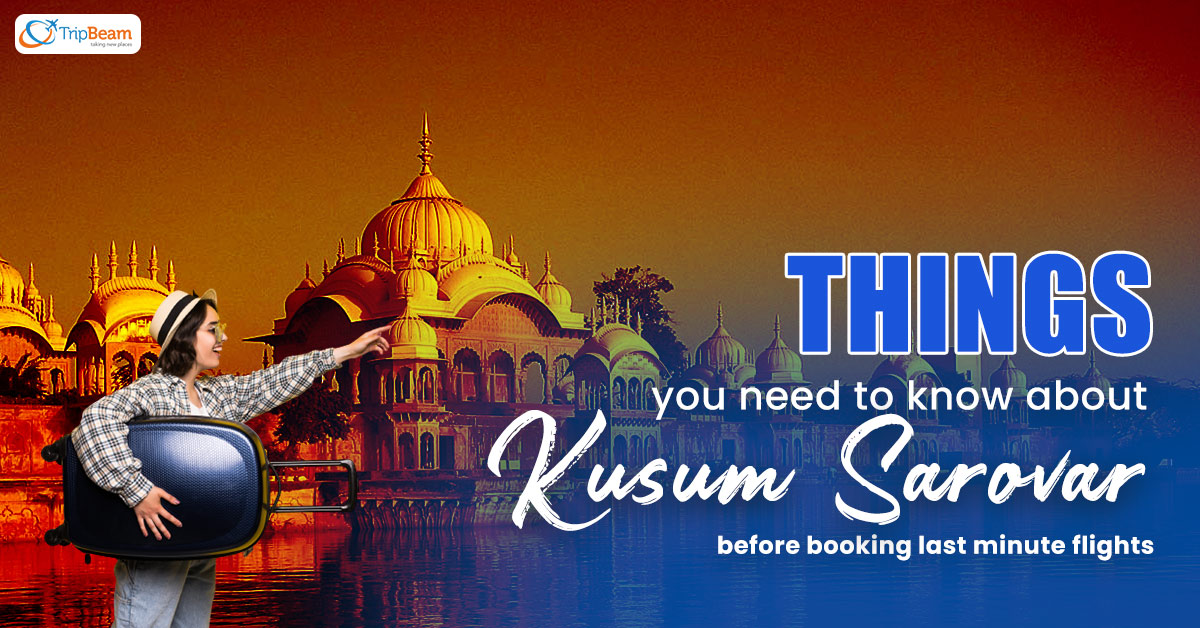
Mathura is one of Hinduism’s seven sacred cities and the birthplace of the much-loved Lord Krishna. Mathura and Vrindavan are twin cities in the state of Uttar Pradesh (located only 10km away from each other). Mathura is a small town dotted with temples of various ages that attract pilgrims from all over the world who land by last minute flights to India.
One side of Mathura is stretched across the Yamuna River, lined with 25 ghats that are best visited at dawn (just after sunset) when hundreds of diyas are floated during the daily aarti.
During the two major festivals, Janmashtami (Lord Krishna’s birthday) in August/September and Holi in February/March, Mathura is inundated with tourists and pilgrims. There are numerous tourist destinations to visit in Mathura & one such captivating place is Kusum Sarovar for tourists book the best travel deals online.
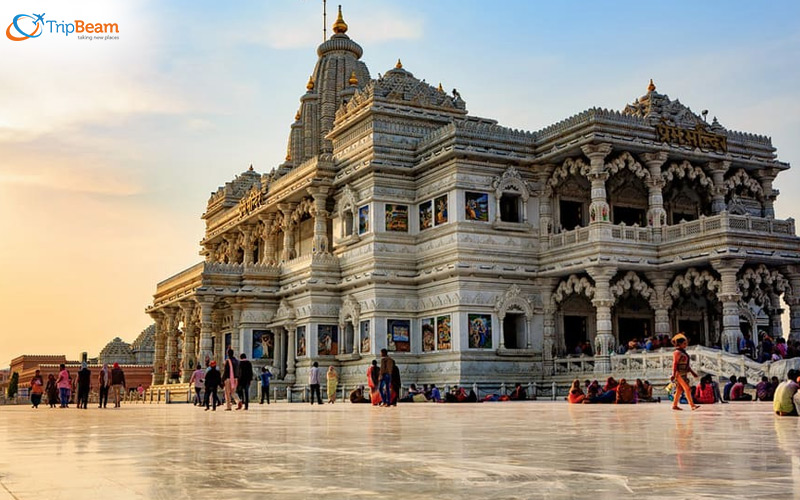
Kusum Sarovar Ghat is a deep reservoir filled with emerald green water that is believed to be the location where Shri Radhaji and her friends used to come to collect flowers. The real reason she went there to collect flowers was to meet Lord Krishna, with whom she would have love quarrels and sarcastic exchanges. According to legend, while collecting flowers, Radhaji’s saree became entangled in thorns, and Krishna went to help Radha rani disguised as a gardener and removed her entangled saree from the thorns. Kusum Sarovar temple, as the name suggests, is surrounded by a variety of flowers, including chameli, Champa, Juhi, and Mallika. Tourists flock in large numbers from all over the world by last minute flights.
Kusum Sarovar is a sacred water reservoir set against a historic sand monument. It is located in the Mathura district of Uttar Pradesh, India, on the holy Govardhan Hill, between Manasi Ganga and Radha Kund. Kusum Sarovar is revered as one of the sacred sites where the Hindu deities Radha and Krishna lived. It is also the location of the memorial chhatri of Jat ruler Maharaja Suraj Mal. Narada Kund, where Narada wrote Bhakti Sutra verses, and the Shri Radha Vana Bihari Temple are both nearby at Kusum Sarovar. There are many Kadamb trees in the area where the mischievous Krishna used to play hide and seek with his friends. During the reign of Lord Chaitanya, a great devotee of Lord Krishna, Kusum Sarovar was known as Suman Sarovar.
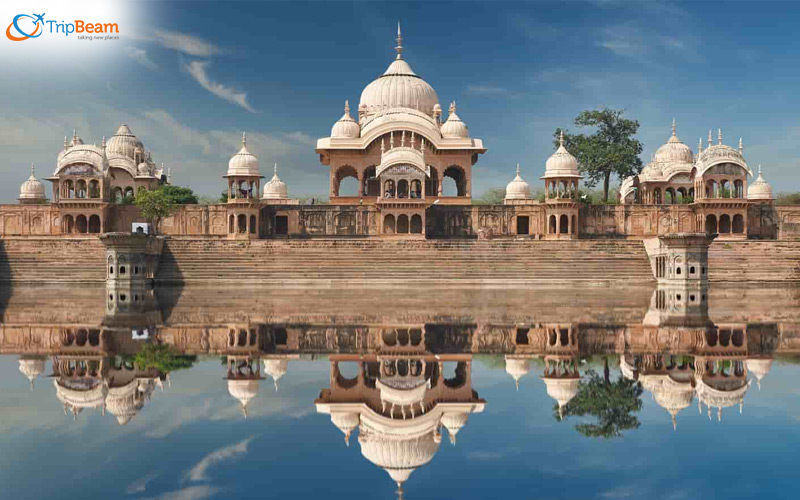
Until 1675, Kusum Sarovar was a natural pond adequately constructed by the ruler of Orchha, King Veer Singh Deo Bundela Rajput of Bundelkhand. King Suraj Mal rebuilt the garden around this location. In honor of his father, Raja Suraj Mal, King Jawahar Singh of Bharatpur built the sandstone monument in the backdrop of Kusum Sarovar in the middle of the 18th century.
In his book “A Handbook for Visitors to Agra and Its Neighborhood,” Henry George Keene described Kusum Sarovar in 1878.
“Beautiful landing places run out into the still water on each side of the reservoir, with deep and wide staircases connecting them; a venerable banyan tree shades the south side and sends pendant shoots into the water… The location is unique in its repose, silence, and irregular charms.”
Henry Geroge Keene
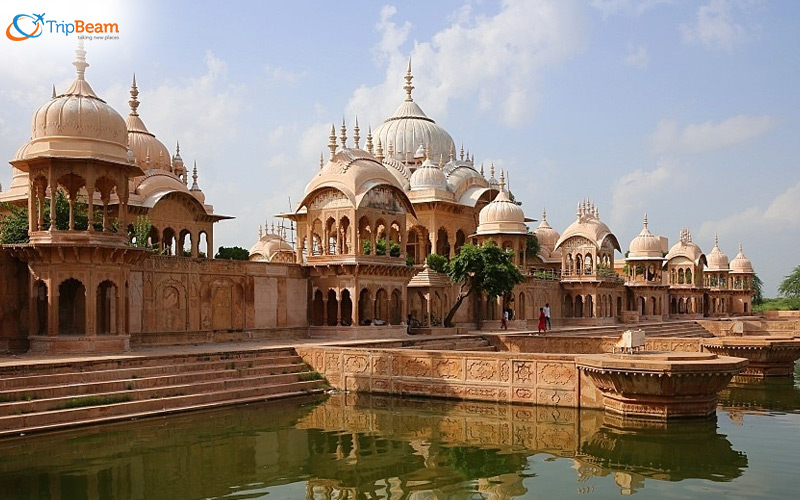
Kusum Sarovar ghat is a 450-foot-long, 60-foot-deep tank. The ghats (pond banks) have a Rajasthani design. A series of steps leads up to the historical building built by King Jawahar Singh on all four sides of the Kusum Sarovar. The arcade walls that surround the pond have a depth of about 60 meters. The pond, which is filled with emerald green water, is surrounded on all sides by a forest of various flowers. Now a popular tourist attraction with domestic and international holiday packages in the twin city, visitors can swim in the reservoir.
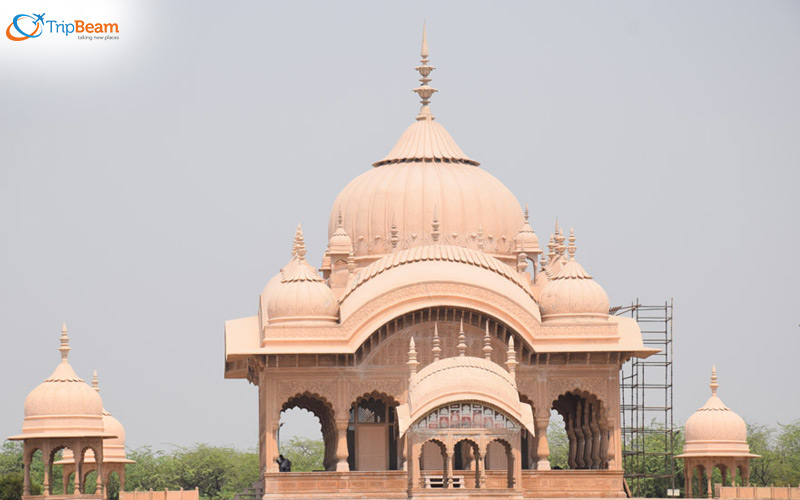
The historical monument was built in memory of King Jawahar Singh’s parents. The main tomb is dedicated to King Suraj Mal and is located in the center of the monumental structure. It is 57 square feet in size. There are two smaller historical structures on both sides of this tomb. These tombs were built in memory of King Suraj Mall’s two queens, Kishori and Hansiya. The entire structure is supported by a 460-foot-long terrace and a pavilion that serves as a cover protecting both ends of the structure.
The architecture and carving inside the tomb are in the pierced stone style, and the cenotaph ceilings are adorned with beautiful paintings depicting the divine pastimes of Radha Krishna and events from Maharaj Suraj Mal’s court. A complete heart-throbbing marvel for international tourists coming by the best travel deals online. The structure also houses a replica of Lord Krishna’s and Radha’s lotus feet.
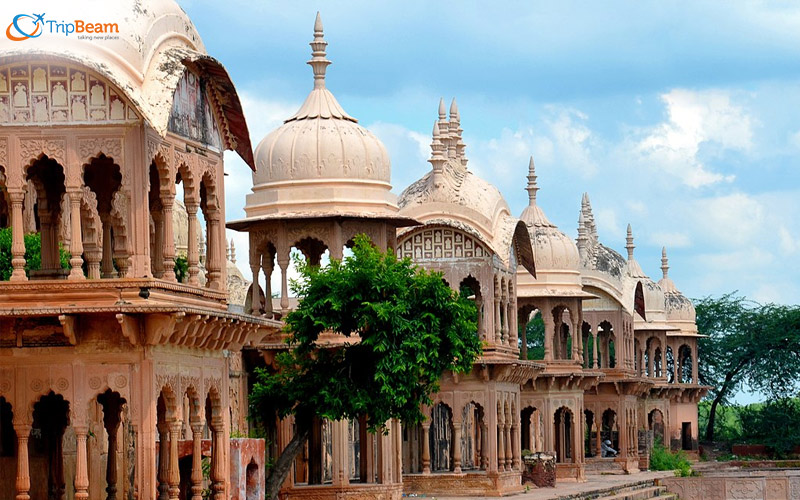
This popular historical site is open to tourists all year and can thus be visited at any time. The winter months are, however, the best time to visit Kusum Sarovar. Beginning in October, the winter season in Govardhan enjoys pleasant weather that is ideal for tourists booking flight tickets to India. The season ends in March. Kusum Sarovar is open all year round. The place is open between 6 a.m. and 6 p.m.
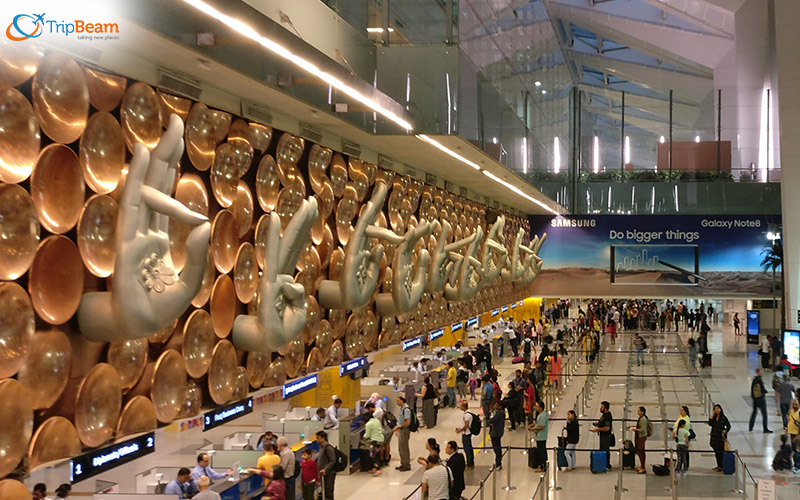
Kusum Sarovar is located between Radha Kund and Govardhan Parvat, approximately 24 kilometers from Mathura, and can be reached by private taxi from top car rental companies in Mathura-Vrindavan. You can also take city buses or auto-rickshaws, but a private taxi is the most convenient option. For travelers booking last minute flights to India, the closest airport is Indira Gandhi International Airport in New Delhi, about 170 kilometers away, and the nearest railway station is Mathura Junction (26kms).
The serene atmosphere of Kusum Sarovar temple is its main draw. The water in the Sarovar is ideal for swimming and relaxing. People from all over the world come to bathe in this sacred pond. The reflection of the sandstone structure in the sacred lake water is breathtaking. This location has beautiful sunrise and sunset views. While resting under the lush grooves of the Kadamb trees, the pilgrim may witness the setting sun. The beauty of the location sanctifies the souls of visitors.
Tell us more details to help better






| Sun | Mon | Tue | Wed | Thu | Fri | Sat |
|---|---|---|---|---|---|---|
30 | 31 | 1 | 2 | 3 | 4 | 5 |
6 | 7 | 8 | 9 | 10 | 11 | 12 |
13 | 14 | 15 | 16 | 17 | 18 | 19 |
20 | 21 | 22 | 23 | 24 | 25 | 26 |
27 | 28 | 29 | 30 | 1 | 2 | 3 |
| Sun | Mon | Tue | Wed | Thu | Fri | Sat |
|---|---|---|---|---|---|---|
30 | 31 | 1 | 2 | 3 | 4 | 5 |
6 | 7 | 8 | 9 | 10 | 11 | 12 |
13 | 14 | 15 | 16 | 17 | 18 | 19 |
20 | 21 | 22 | 23 | 24 | 25 | 26 |
27 | 28 | 29 | 30 | 1 | 2 | 3 |